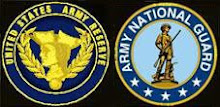 U.S. Army Reserve Pfc. Jason Black (standing) and U.S. Army Pfc. Nathan C. Fischer both of Bravo Company, 264th Medical Bn., practice their radiology training. Black demonstrates the use of the X-ray machine as part of his radiological specialist training at Fort Sam Houston, Texas. (Army Reserve photo by Lt. Col. William A. McCaskill Fort Sam Houston Public Affairs Office)
U.S. Army Reserve Pfc. Jason Black (standing) and U.S. Army Pfc. Nathan C. Fischer both of Bravo Company, 264th Medical Bn., practice their radiology training. Black demonstrates the use of the X-ray machine as part of his radiological specialist training at Fort Sam Houston, Texas. (Army Reserve photo by Lt. Col. William A. McCaskill Fort Sam Houston Public Affairs Office)By 1st Lt. Olivia Cobiskey
Director of Marketing - Media
Employer Partnership Initiative
FORT SAM HOUSTON, Texas –Jason Black has a job lined up with Inova Health System as soon as he finishes the Army's radiology specialist program.
"I feel like I hit the lottery," Black said.
Black was the first person hired under the Army Reserve Employer Partnership Initiative, a public-private venture that allows the Army Reserve and employers to recruit, train and employ people interested in serving their country and in pursuing civilian careers fields like health-care, transportation, law enforcement and construction.
Black, who had worked on his associate's degree in general studies while an executive caterer with Capital One, decided to switch careers and had started his course work in radiology when a recruiter told him about the EPI.
The decision wasn't hard, Black said.
An Applied Science Degree in radiography at Northern Virginia Community College takes five semesters, which is 72 credits, including 10 prerequisite credits, and costs more than $20,000.
The Army's radiology specialist school is only 46 weeks – half the time, said Black, now a private first class in the Army Reserve and in the school's first phase.
"This allowed me to go to school and still handle my responsibilities as a father and take care of my family financially," said the 28-year-old Soldier. "I thought it was a win-win situation all around."
Black will complete his second phase, a 22-week practical internship at a military hospital in D.C., at Walter Reed Army Medical Center or in Virginia at Fort Belvoir Community Hospital to be close to his wife, Judith Rodriguez, a financial manager at Capital One, and their three-year-old daughter, Jasmine, in Woodbridge, Va.
Brig. Gen. Lie-Ping Chang, commander of the 807th Medical Command, agreed the partnership makes everyone a winner.
"It's win-win for everyone. It's good for the Soldier, for the employer and the community," said Chang, 59, a family practice doctor in Virginia. "In today's environment, it is very challenging to find a job and pay for school. The medical industry is one of the few sectors still hiring."
Three more individuals have taken advantage of the program and will be leaving for basic training this summer, Chang added.
Once the Soldiers graduate from the Army's radiology course they qualify to sit for the national exam of the American Registry of Radiologic Technologists (ARRT). Black plans to take the ARRT certification exam as soon as he finishes his internship. Soldiers also receive 57 college credits when they complete the radiology specialist school and 12 credits once they pass the certification exam.
"That's 69 credits, I can transfer 33 credits from my associate's degree, I believe, I'll only be six classes shy of receiving my bachelor's in radiology," said Black, who has both the G.I. Bill and tuition assistance. "I'm thinking about putting in my OCS packet after I get a little bit of training and my degree."
Daniel Nichols, director of Recruitment and HRIS (Human Resource Information System) for Inova, said a radiation technologist staring salary is $51,000. Black can expect to see a significant raise – anywhere between 3 and 10 percent – his first year, Nichols added.
Nichols said the partnership has helped fill positions throughout the five hospitals that make up Inova’s integrated health care system in Virginia. Inova has also hired a respiratory therapist and a surgical technician through the partnership.
One of the issues Inova was facing before the partnership, was there simply were not enough graduates from local schools to fill its positions. Now the Army Reserves is providing employees that have both clinical and leadership experience, Nichols added.
"You can't equal that in the civilian world," Nichols said. "The Army has a far more robust clinical training aspect to their program – which allows service member to hit the ground running."
Nichols recommends the program to anyone considering a career in health care. Positions in health care are portable – that means Citizen-Soldiers are able to find jobs nearly anywhere even internationally, Nichols said.
As nice as the pay raise sounds – a private first class makes around $20,000 a year - it isn't just about the money, Black said. The same thing that drew him to the Army Reserves drew him to radiology – service, he added.
"I like the fact that when I go to work, I'm helping somebody. I can go home feeling good about myself, that I've accomplished something as an individual and as a Soldier," Black said. "I'm a good role model to my daughter."
Black will drill with the 48th Combat Support Hospital at Fort Meade, Md., once he finishes his training and begins his job at Inova. Creating synergy between Soldier's military and civilian career helps maintain the Soldier's clinical competency in both their civilian and military careers, said Chang, who helped initiate the relationship between Inova and the Army Reserve.
"It's not just a job, it's a career," Chang said. Black agreed the Army Reserve has given him more than a career."It's been a good experience," Black said. "It's been hard, but if you can get through basic training at Fort Benning, you can accomplish anything."




No comments:
Post a Comment